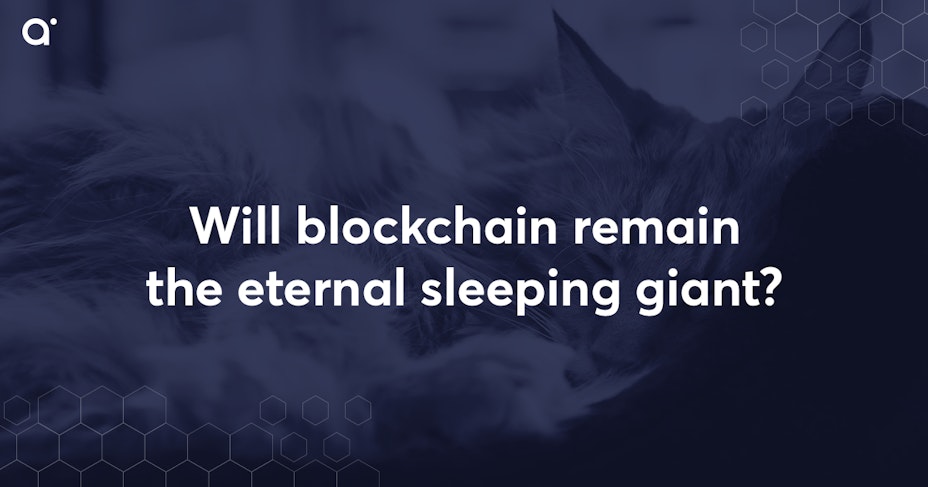Will blockchain remain the eternal sleeping giant?
- 5 minute read

Blockchain has been around since 2009. That was the year the genesis block of the Bitcoin blockchain was mined. Now, 14 years later, blockchain has expanded to include thousands of cryptocurrencies and hundreds of concepts. The question I ask myself is where is all this going to lead and when?

Brief summary:
✔️ Blockchain has important features: decentralization, trust, immutability, increased security, and anonymity.
✔️ The goal of blockchain is to eliminate intermediaries and democratize processes.
✔️ Established interests, such as financial institutions and governments, slow down the adoption of blockchain and cryptocurrency.
✔️ A standard is lacking in the blockchain and cryptocurrency sector, which hinders further development and acceptance.
Table of Content
- The promise of blockchain
- Past promises
- Opposition to blockchain and cryptocurrency
- The future of blockchain and cryptocurrency
The promise of blockchain
OK, so a lot has happened. One great concept and the next brilliant coin passes and they almost all have one thing in common: promise.
But you can’t make a chimney smoke out of promises. There must also come a time when the embrace of blockchain and cryptocurrency becomes mainstream.
There is a lot of money in cryptocurrency, but if you compare it to the world’s GDP it is peanuts. At the time of writing, the market capitalization of all cryptocurrencies combined is around 1,000 billion. The total GNP of the world is hundreds of millions of billions.
So, every euro that is in crypto is like a grain of sand in a pile. The world’s GDP is, say, 1 million times larger. Well, cryptocurrency has not been around that long, and patience is a virtue.
That’s true, of course, but it needs to get going!
What are the promises of blockchain?
1. Blockchain is decentralized. This means there is no central single point of failure. By keeping track of the blockchain on computers distributed around the world, the blockchain is always online and virtually impossible to forge. This is different with data centers, the Google cloud, or a bank, for example. If there is no power or there is corruption, then these organizations can go on lockdown.
2. Blockchain is trustless. That means you don’t have to trust a company, the security is built into the blockchain technology itself.
3. Blockchain is borderless and immutable. A Bitcoin is transferable to any person in the world at market price. Also, the state of a blockchain cannot be changed afterwards, once a block is created it is fixed forever, thus eliminating corruption in this sense.
4. Applying cryptography increases security when sending.
5. Anonymity. The blockchain keeps track of which wallet has what, but not who that wallet belongs to.
6. Anyone can participate in blockchains.
7. I think the main promise of blockchains is the elimination of the middleman. High fees are paid for intermediaries in all kinds of professions, such as notary, accountant, or lawyer. Through blockchain, you can settle this peer to peer.
So, blockchain is typically something for people, not companies or politicians. Blockchain can democratize the world and make it more egalitarian in many ways.
With this promise also comes into play the position of vested interests. Intermediaries and banks in particular will view blockchain and cryptocurrency with displeasure, and governments, despite CBDC (central bank digital currency - blockchain money), do not seem to be too fond of it either, given the regulations.
Past promises
There have been a lot of promises in the history of mankind. When you are in the middle of such a revolution, you are in danger of losing track quite often, because you are too close to the paper.
What helps more often is zooming out. And comparison material.
During the industrial revolution, the Spinning Jenny emerged. This threatened to put the textile workers out of work. They rebelled and destroyed a whole battery of these machines. Needless to say, you can’t stop progress. Whole hordes of people who were doing hard and dirty work were replaced by machines and usually got a better life.
A little shorter ago you had the advent of the computer. At first you had to fiddle with punch cards to work with them. During World War II, huge machines were built that were electronic for the first time.
Then began the process of miniaturization. After all, a machine a few classrooms in size is not very convenient to have on your lap. In 1980, the PC was finally a reality. It grew very quickly in popularity and dropped tremendously in price. Today, a computer is built into a whole range of devices and is everywhere on the Internet of Things or smart machines, like your thermostat that you start up with your cell phone before you get home.
Within 100 years, it turned an unwieldy machine into an item that can be found in almost any device of any importance. The computer has provided tremendous advancement for mankind and is one of the best inventions ever.
The Internet has a fairly short history. In 1957 ARPA (Advanced Research Projects Agency) started to connect universities in an efficient way. The reason was not to be surprised by the technological development of the then enemy, the Soviet Union.
In 1969, the first message was sent between two nodes. After that, more governments and companies connected. In 1974, TCP/IP was invented, and the promise became a reality. In 1978, the first spam mail was sent. In the 1980s, the Internet became available worldwide.

Telephone lines and dial-up were still used at first, but the Internet as we know it today, always online, soon followed in the 1990s.
The industrial revolution lasted a few hundred years. The rise of the computer around 100 years. The Internet was cobbled together and commercialized in a few decades.
There you have it. That which is good cannot be stopped. And it will become mainstream faster and faster because of advanced technology.
Opposition to blockchain and cryptocurrency
There is a small problem with the outside world, though. Blockchain and cryptocurrency are a threat to vested interests with long arms and deep pockets.
We will mention a few:
- The financial world
- Intermediaries
- Governments
- All kinds of government or business organizations
Banks and governments in particular can throw a spanner in the works. Banks by lobbying politicians to thwart blockchain and cryptocurrency. Governments can sprinkle bans and create all kinds of regulations that throw sand in the machine.
This may delay the mainstreaming of blockchain and cryptocurrency. Obviously with the best of intentions!
Looking beyond vested interests, we can see that blockchain and cryptocurrency will be especially good for individuals and democratized institutions and companies that want to use advanced technology that is incorruptible.
The future of blockchain and cryptocurrency
I consider it likely that this technology will be unstoppable. What is still missing, however, is a standard.
When you start using a machine you get higher production.
When you start using a computer you work faster and more precisely.
When you start using the Internet you can communicate with the whole world.
If you are going to use blockchain and cryptocurrency, yeah well, what?

The lack of a standard response to this and the multitude of blockchains and cryptocurrencies could mean that the promise of these two is stuck in good intentions.
Are we at a crossroads that we just don’t want to cross? Does a standard cryptocurrency need to rise to overpower all others? Does blockchain need some more development before it becomes mainstream? Are vested interests going to drag things out?
According to the ever-faster development of things, in the foreseeable future a standard should emerge that is as easy for any user to use as a machine, computer or Internet.
But perhaps blockchain and cryptocurrency cannot be standardized (for now). In that case, it could be a long and hard labor, or the giant will be trapped.


